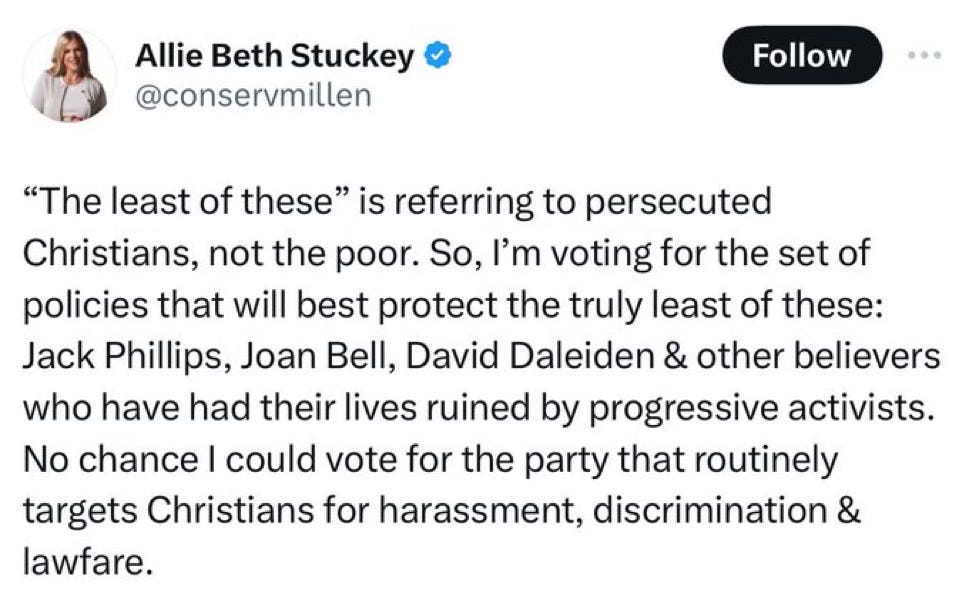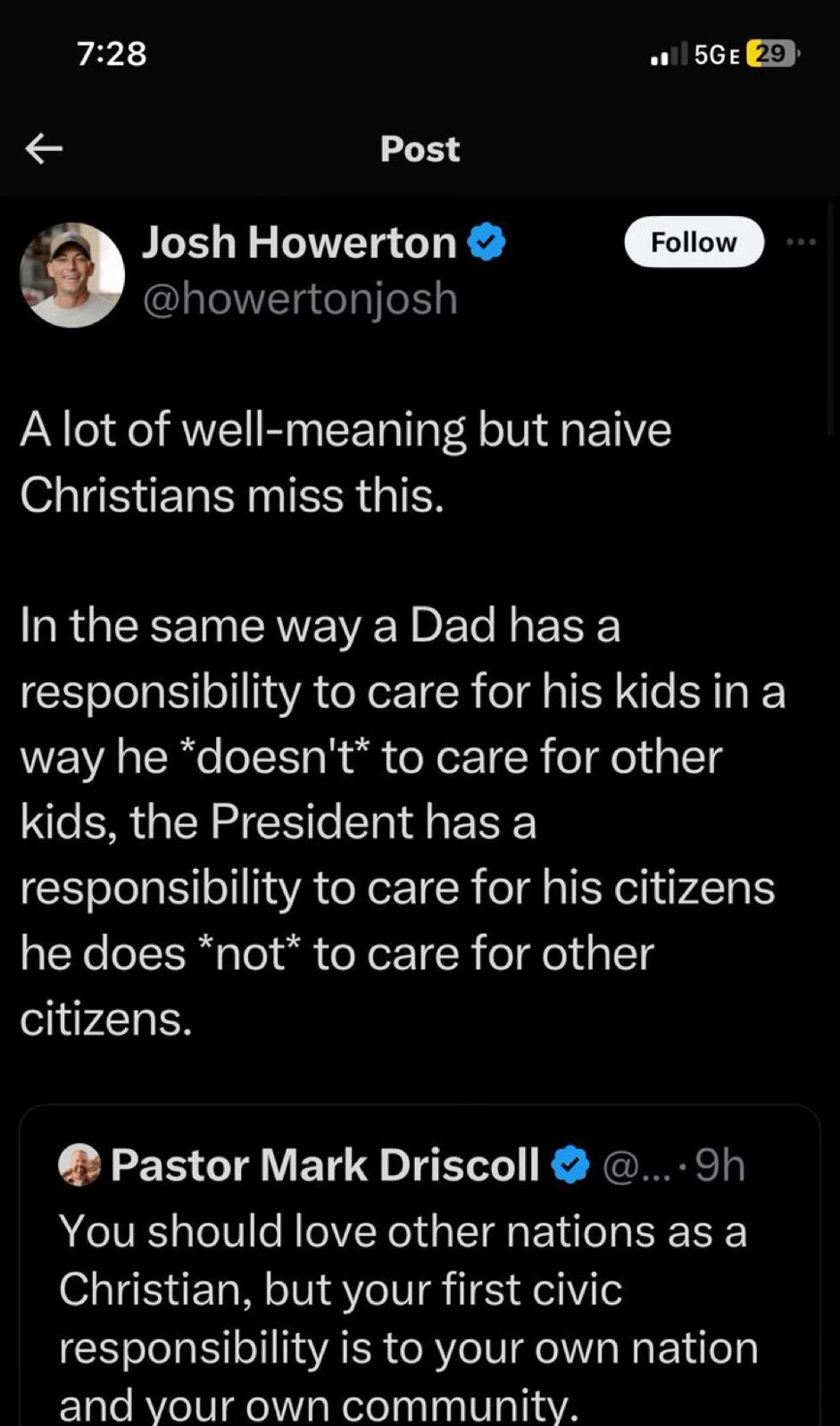Sliding Into Moscow
How a few influencers are legitimizing one of the most dangerously fundamentalist cults in America
I almost couldn’t believe it. I had no idea Allie Beth Stuckey was putting a book out. Now that’s not too surprising since I don’t listen to her, and she blocked me on social media a long time ago. What surprised me was the title and subject of her book, Toxic Empathy. Her main thesis (I have read the introduction) is that “progressives” are now “weaponizing” empathy. That calls towards “tolerance” and “acceptance” are manipulating people to accept positions on things like Transgender rights, or LGBTQ representation, or on Diversity Equity and Inclusion, that they shouldn’t. She considers these calls to “empathy” as now being “toxic”.
What shocked me is this concept isn’t new or something Stuckey “discovered”. It in fact is a long held and argued issue put forth by former Bethel College and Seminary President Joe Rigney. His concept is that “Rightly used, empathy is a power tool in the hands of the weak and suffering. By it, we can so weaponize victims that they (and those who hide behind them) are indulged at every turn, without regard for whether such indulgence is wise or prudent or good for them…” Rigney’s central idea is that the Christian should, since they possess the “truth” of God, not get “bogged down” in wishing to help or understand what someone else is experiencing. To “go to far” is to lose sight of this “truth” and be “dragged down” with someone else. Rigney puts it, ““Empathy is the sort of thing that you’ve got someone drowning, or they’re in quicksand, and they’re sinking. And what empathy wants to do is jump into the quicksand with them, both feet, and it feels like that’s going to be more loving, because they’re going to feel like, I’m glad that you’re here with me in the quicksand. Problem is you’re both now sinking.”
Stuckey’s book absolutely shares Rigney’s concern only with most of the “hot button” issues many Political Conservative Evangelical Fundamentalists get excited about. Stuckey in her introduction relates how she herself was “shocked” and concerned with the deaths of George Floyd and Ahmaud Arbery, however when people began to speak about “systemic racism” and the possibility that the way America polices might be the problem it went too far for her, “I couldn’t get on board from mourning what appeared to be the inhumane treatment of a fellow image bearer of God to an indictment of America and the police as a whole.” (That she equates policing and a “colorblind” presumption of reality with “America” says much) Stuckey likewise wants to “stand” on supposed “truth”. She bemoans that (as almost every Conservative talking head has for decades) “liberals” and “progressives” are supposedly “change the meaning of words”. Her multiple “Red Flags” almost all center around the idea that first there is some kind of “objective” use in language, and that “God’s word” can and should only be read a certain way (one that affirms her political beliefs not those of others because of course Allie isn’t reading the Bible politically). Allie’s presumption, like Rigney’s is that she sits on a “solid ground” of supposedly “objectively true” belief. Her fear is that the wily progressives are going to deceive her readers with their manipulative appeals to emotion.
Objections to Allie and Rigney’s Presumptions
Now there are immediate problems with Allie’s (and by extension Rigney’s) presumptions. The first is that there is some sort of “objective authority” one appeals to when it comes to language. One can appeal to the “objective consensus” when it comes to words, but not that there is anything truly “objective”. This is because language is a shared communal act. As people use language the language changes due to the people using it. Just because God gave Christians “The Word” doesn’t mean we have authority over words. (for more on “natural theology” check here)
This ties into another assumption, that the Christianity that Stuckey and Rigney espouse is “objectively true”. Allie assumes what she believes about what the Bible says is obviously true and of course true by “common sense” reason (evidenced by her complete lack of any sort of references in her introduction). This is of course problematic because what Stuckey and even Rigney believe are in many cases minority positions not just in Christianity but in Evangelicalism itself. Stuckey’s assumptions on all of the political views she tackles are by no means universally shared by most Christians even by many Conservative Evangelicals. In fact, for both Rigney and Stuckey their unexamined presumption of standing on “solid” ground makes them, I would argue, MORE susceptible to being deceived because their dogma must never be scrutinized.
The Problem: It Really Doesn’t Matter
Here’s the issue with the entire “sin/toxic empathy” idea- even if one rejects whatever the “world” is “pushing”. Even if a Christian comes to a conviction about the “truth” AND you believe that “truth” is universal, you still have to deal with being in community with those who disagree with you. It doesn’t matter how clear you are in your conviction the question remains, what will you do with those who think differently than you?
In reality, when it comes to conflict either in a small family community, or on the broader cultural scale we all (no matter the political convictions) have four options.
1. We come to an agreement. Either “we” convince “them”, or “they” convince “us” we all simply agree. This could simply be as trivial as where to eat dinner, or that certain things need to be done by the government. Once we agree there is no conflict.
2. We “agree to disagree” in compromise. This is honestly where we most land with people we are in community with. We set boundaries, negotiate language, and come to a place that while perhaps not ideal for everyone is livable. This means compromise. Unfortunately, as Christopher Paolini once said, “A good compromise leaves everyone angry.” Most people don’t like compromise because it takes work, necessitates working through personal offense, and ultimately for idealists means not getting everything you want. However, if we are to live in community with others, we have no other option.
3. We disfellowship. This is where we simply cannot associate, we cannot befriend, we cannot be in community together. We live separate and estranged.
4. We coerce and force through power or some other means. This is where, by law, by cultural shame, or some other form of coercion one group’s preferences dominate everyone else’s.
What I fear is that Stuckey’s book is a primer for putting people in the mindset of demanding some form of supremacy. This has been the winning formula for Evangelical Conservatism for decades- tell people what they already believe is right, tell them it’s everyone else who is being “unreasonable”, and more often than not couch reasonable compromise as “oppression”. This has led to a decent into Fundamentalism where often “searching for agreement” is actually a veiled means of coercion and where that fails there is a disfellowshipping. However, the disfellowshipping is always temporary as fundamentalists believe coercing someone into obedience is “loving”. This leads to an embrace of Christian Supremacy.
Introducing a Wolfe to a Wider Audience
Stuckey’s repetition of Rigney (unattributed at least in her introduction) is not the only concept coming out of Doug Wilson’s orbit to be repeated by both Stuckey and others recently. Note the sentiment shared by Stuckey, Megan Basham, Mark Driscoll and Josh Howerton:
The through line in each of those posts is an idea that the Christian’s first duty is to those like them, not to the “other”. This is the thesis for Stephen Wolfe’s book (published by Canon Press). From Wolfe, ““The instinct to love the familiar more than the foreign is good and remains operative in all spiritual states of man” (118). Reviewer Wyatt Graham summarizes Wolfe like this, “I grant that my next-door neighbor by circumstance will generally be a closer friend than someone who lives across the city whom I have only met once. But Wolfe is saying more than this. He is saying we should love some kin over other kin; we should love what is close to us more than others.”
What Basham, Driscoll, et al are promoting is an ethic that says, “You need to love the people who are like you more than those who are not like you.” Essentially those who are “like” get not just preferential treatment, but the basic Christian ethic of “treating your neighbor as you love yourself”. I would argue (as others have with Wolfe’s book) that the main impetus behind the promotion of this ethic is to “other” those who are “not like” so they can be treated as less. I think it’s very important to emphasize what Wolfe’s ideology and by extension those who are parroting it are implying, that if someone is “other” it is ok for them to experience loss, harm, or the loss of rights if in doing so those same are “secured” for “us”.
The Alistair Begg Example
Some will remember the story that almost “cancelled” Alistair Begg (and may have hastened his retirement). Begg received a question from a grandmother asking if it was ok for her to attend her granddaughter’s (who is also Transgender) gay wedding. Begg counseled her that her relationship with her granddaughter was more important than the possibility she might sin or be “promoting” sin in her granddaughter’s lifestyle. Begg was loudly decried from many Evangelicals and was uninvited from speaking at the 2024 G3 conference.
Where the Stuckey/Driscoll/Howerton/Basham/Wolfe/Rigney mentality ends is always sacrificing relationship over ideology. It’s preferring those similar to you in belief and disfellowshipping from those who don’t. If they were honest however, they would say that the government should prevent people from being Trans or from allowing gay people from getting married. In other words, they would ensure that the “grandmother” in Begg’s story should have never been in a situation where she would have to make that choice because they would make her granddaughter effectively “illegal”.
Of course, the first problem is what becomes “illegal” after you get rid of the gays? What next has to be outlawed so that people don’t have to be confronted with that which is different than them? Sure, many would claim some “Biblical” pretext, but we must remember that not too long ago there was “Biblical” pretext for segregation, being anti-miscegenation, and ultimately slavery. It is important to note that right now the biggest issue that Doug Wilson and the CREC (Wilson’s “Denomination”) are dealing with is the proliferation of Nazis within their circle and among their online spaces. That isn’t a euphemism, actual Holocaust denying, Germany in the 1930’s loving, antisemitic racists are so loud and vocal that Wilson has tried to address his followers on it, twice.
Here is the ultimate problem with all of the ideals flowing out of Moscow, and it is that there is no grace. The entire ideology everyone who is pushing Wilson’s fundamentalism from Rigney to Stuckey to Driscoll to Butterfield is that “repentance” is necessary for grace. That you come to their way of seeing the “truth”, agree with them, and then you will receive kindness and love. What they are offering is a “gospel” of self-righteousness. That because of their discernment and “common sense” only THEY have the “truth”, and you can either become “righteous” like them or suffer the “just” wrath for your “sins”. Ultimately, it’s a “gospel” that only needs to be able to check off a Conservative Ideological Report Card of historically Republican talking points. They certainly aren’t offering anyone Jesus. And I wonder if that’s because they actually don’t need him.
(Thanks for reading! I’m always grateful for those who lend me their time. If you want to get my latest please subscribe and consider supporting me in making this content. If you’d like to gift a one-time gift of coffee or dinner, that would also be appreciated https://venmo.com/u/Jason-Mallow-1 Lord willing I’ll see you again next week)






In your discussion of the four options, I think you’ve either missed one, or have at least missed a “flavour” of option 2. What you have described as compromise if a form of “lose/lose” thinking, but there is such at thing as “win/win” thinking, if one is able to put aside the assumption of a zero-sum-game.
Great article. I’m often struck by how Christians end up functioning like The Borg in Star Trek TnG. Their objective seems to be the assimilation of everything into themselves.
It might be enlightening for them to read Screwtape’s Letter 8.